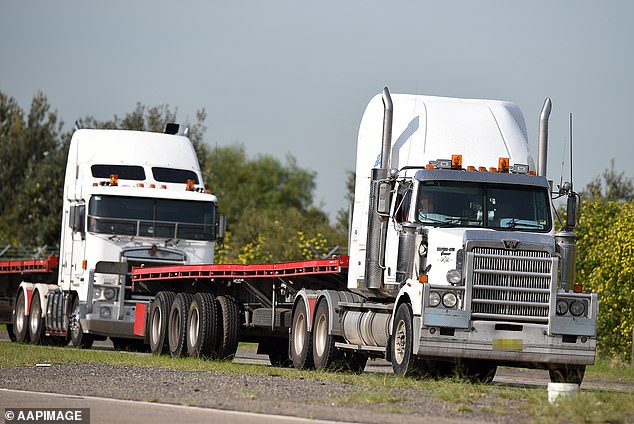A trucking company that has been operating for 57 years across several states in Australia has become the latest to collapse.
DJK Transport entered voluntary liquidation on Friday, after a restructuring practitioner was appointed in July.
The company is registered in Austral, western Sydney, under the name of sole shareholder and director, David Kean.
DJK delivered freight cargo across New South Wales, Queensland, Victoria and South Australia.
The company did work for mining companies, as well as supermarkets and department stores.
DJK ran interstate routes with trailers, flat-top and tautliner trucks.
Daily Mail has contacted Mr Kean for comment.
It comes as two other transport companies, which also have Mr Kean as the sole director, entered voluntary liquidation on Friday.

DJK Transport has entered voluntary administration after nearly 60 years (above, file image of trucks on Foreshore Road, Sydney)
AKG Trucking and Round Em Up Transport have both appointed external liquidators.
Transport and logistics heavyweight XL Express went under at the beginning of July, after operating for more than three decades.
The company had, at one point, raked in enough profit to sponsor the Brisbane Lions AFL team and purchase logo rights to their uniform.
It is understood some 200 people were employed at XL Express and its related companies.
Don Watson Transport, a 77-year-old business, collapsed at the beginning of June.
The family-run business had more than 300 staff and operated 310 vehicles across the country.
The company began in Melbourne using ex-military Austin trucks in 1948. It later expanded across the nation’s east coast.
Managing director Lyndon Watson blamed the closure on the tough economic climate, in a memo sent to staff at the time.

Former Brisbane Lions sponsor XL Express went under at the beginning of July (above, Lions players with XL Express managing director Colin Mallory in 2019)
‘Due to current economic conditions, the Don Watson Group of companies has made a definite decision to leave the warehousing and road transport industries,’ the memo said.
‘We understand that this may come as a shock, but we have formed the view that is simply no longer possible to continue to operate.’
Financial year 2024-2025 was the worst on record for insolvencies, with 14,105 businesses going under, up 26.8 per cent from the last financial year.
ASIC data also showed insolvencies had increased by 153 per cent between financial years 2021-2022 and 2023-2024 in the transport, postal, and warehousing sector.
The sector has been grappling with decreasing profit margins and stalling rates of productivity.
Jimmy Trpcevski, Managing Partner of WA insolvency Solutions, said in May that his company had seen an increase in inquiries from the transport sector.
‘Businesses are being squeezed from every direction – whether it’s rising operating costs, labour shortages, or compliance pressures,’ Mr Trpcevski said.
‘Margins are incredibly thin, and many operators simply can’t absorb the extra costs.’

Transport companies have been struggling with rising costs and decreased productivity (stock image
Hymans Valuers and Auctioneers CEO Ian Hyman said the market for second-hand trucks had plunged since the pandemic.
‘During Covid, there were major supply chain issues and delays of more than two years for new trucks, that drove second-hand prices up 50 to 60 per cent,’ he said.
‘Truck prices have [since] fallen sharply, especially for older assets, with some dropping as much as 70 per cent.
‘Companies are grappling with high insurance rates, high rents and soaring fuel bills, and they’re finding it hard to secure yards and storage facilities. Everything is working against them.’

